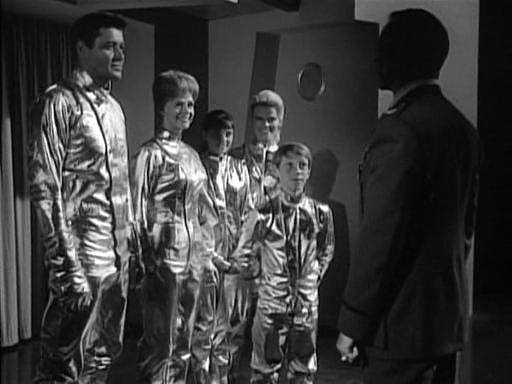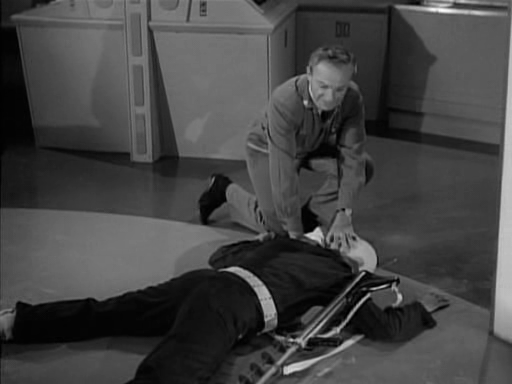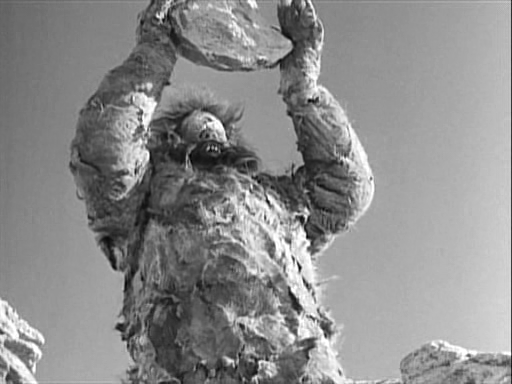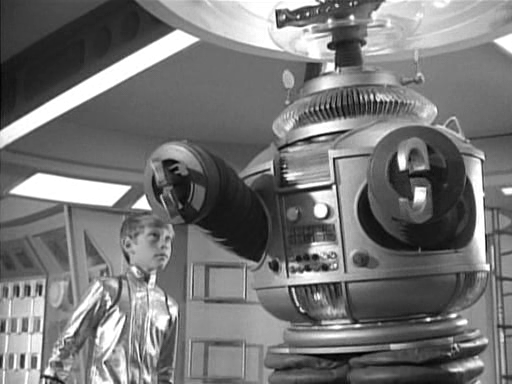While shows like Star Trek took place hundreds into the future not so with Irwin Allen's shows, though a futurist he set his stories in the "not too distant future" and thus the pilot episode of Lost in Space “The Reluctant Astronaut” took place in the year 1997, a mere thirty years into the future. The basic premise of Lost in Space dealt with the United States launching the first of many planned colony missions to a planet orbiting the nearest star, Alpha Centauri, this being due to the Earth’s severe over population reaching the point where finding life off world was humanity’s last hope. The crew consisted of Professor John Robinson (Guy Williams), his wife Maureen (June Lockhart), their children Judy (Marta Kristen), Penny (Angela Cartwright), and Will (Bill Mumy), and joining the family was their pilot, U.S. Space Corps Major Donald West (Mark Goddard), who was there basically in case anything went wrong with the ship's navigation or guidance system.
What could go wrong with Zorro on board?
Of course something does go drastically wrong, though not because of any technical malfunctions, but instead at the hands of the traitorous Dr. Zachary Smith (Jonathan Harris), who was the Alpha Control's doctor but also working as a saboteur for a competing foreign nation. Those familiar with the show will most likely remember Dr. Smith as the cowardly buffoon who spouted such alliterative insults as “You bubble headed booby” or “Cantankerous Cold-hearted Clump” but in season one of the show he wasn't there simply to fill out the comic relief quotient, he was damn dangerous. Season One episodes though family friendly were more science fiction based than what was to follow, and it was only later that the tone of the series went from Star Trek level of science fiction to basically Gilligan’s Island in Space. In the pilot episode Dr. Smith not only sabotages the Jupiter 2, programing the mission’s robot to destroy the spacecraft eight hours after launch, but when he is discovered aboard the ship prior to launch he judo chops the poor security guard and tosses him down a waste disposal chute.Note: In the original script to this episode Dr. Smith had a hidden needle in his ring that poisoned the guard but the Network thought that was too nasty for a show aimed more or less at children so it was changed.
One of the more interesting things about the character of Dr. Zachary Smith is that he wasn’t originally part of the show at all. In the original unaired pilot “No Place to Hide” not only did the character of Dr. Smith not exist but neither did the ever popular robot, instead of sabotage the Gemini 12 (later changed to Jupiter 2 for some reason) goes off course when it was unable to avoid a meteor shower. The Robinsons spend three years in suspended animation while their ship flies off course before crash landing on some strange uncharted planet, leaving them lost in space. This never aired pilot was full of wild adventures with the Robinson family fighting a couple of giant cyclops, discovering ancient alien ruins, and crossing an inland sea that almost destroyed them by sucking their amphibious chariot into a giant whirlpool, but the Network didn’t think the show could work with each and every week the family basically running from one random threat or another, they believed it needed an ongoing adversary.
Exit giant cyclops, enter Doctor Smith.
The meteor shower that disables the Jupiter 2 still occurs but no longer is it because of crappy navigational software but because of Dr. Smith being accidentally being trapped onboard the ship, having to do some last minute tinkering to insure the robot has its power pack so that it could “Destroy Jupiter 2” after the launch, his additional two hundred and fifty pounds of body weight causes the ship to veer off course into a swarm of meteoroids. I must say that both versions of the pilot do not paint a good picture of this mission for if the ship’s onboard systems can’t compensate for additional weight, and adjust the ship’s flight path to avoid destruction, it's not a very good computer. So Doctor Smith or no Doctor Smith this mission was pretty much doomed from the outset.Large balls of tinfoil are one of the more dangerous hazards in space.
With the crew of the Jupiter 2 in suspended animation it’s up to Dr. Smith to save the ship from being bashed to pieces by the meteoroid swarm. (Science Note: At the speed the Jupiter 2 is traveling an impact with meteors the size we see here would have pretty much vaporized the ship.) Smith is able to wake up Major West, who is then able to steer the spacecraft out of harm’s way, and then the Robinson family are revived to discover that they are far from their intended destination.What about the robot, you ask? Well Smith’s programming of the robot to destroy the Jupiter 2, and his attempts to stop it once he finds himself trapped aboard, is about the worst case of contrived padding I’ve ever seen. When Smith realizes he is an unfortunate passenger on a doomed craft he turns off the power to the robot but he only manages to move the on/off switch to the halfway position, and this simply causes the robot to lumber over to the control panel and move the switch back into the on position. Then later he tries to remove the robot’s power pack but is hampered when John Robinson is forced to turn off the artificial gravity so that they can do repairs on the ship. After some goofy floating around he eventually does get the power pack off of the robot but then Will Robinson, not knowing that this mechanical marvel is their death sentence, places it back and then the robot finally gets to go on its rampage.








No comments:
Post a Comment